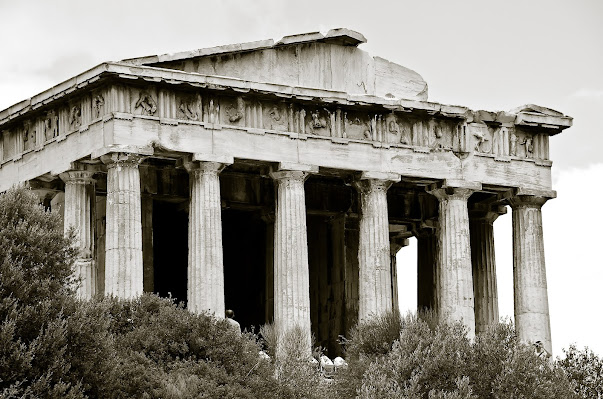Reading Notes: Homer's Iliad, Part A
For my notes this week, there were a few characters whose stories I want to think about and understand better, possibly for my storybook, but also in general.
Hephaestus. Foundry Painter. Web Source: Wikimedia Commons
The first character that I feel a lot of admiration for is Hephaestus. In the fourth section, "What Thetis Did for Her Son," we see Hephaestus in his roll as a peacemaker. He is willing to intervene for the sake of peace on Olympus, even to the extent of purposefully submitting himself to the mocking and humiliation of the other gods. When he took on the role of the boy who carries the cup of wine, it broke my heart. Not only does it highlight the cruelty of the other gods in the way that they scorned him and laughed at him for his appearance and his limp, but it especially draws attention to his selflessness in contrast to Zeus's and/or Hera's selfishness. Depending on the version of Greek mythology that you look at, either Zeus or Hera threw Hephaestus off of Mount Olympus, leading to his limp. In Homer's version, it is Zeus who caused this deformity, but there are versions that say it is Hera. Homer also references Hera as Hephaestus's mother. So, in any case or combination of events, the cause of the tension is still the bickering between Zeus and Hera. If we stick to the Homeric description, Zeus is mocking someone for a deformity he gave them, and Hephaestus endures it in the name of peace. Hera is laughing at her son, someone she is supposed to love unconditionally, because of a squabble with Zeus. I want to develop more of Hephaestus's story and write from his perspective, or at least portray him in a way that highlights his character and strength.
Hector, Andromache, and Astyanax. Web Source: Wikimedia Commons
The next character(s) that I really wanted to know more about is Hector and his family. We get a glimpse of how awful the war is for this family in Hector and Andromache parts I and II. Even though we see that Hector does have a cruel side in the way he kills Patroclus at the end, we see that he is fighting a war he has no real stake in. He is risking everything he has, risking never seeing his wife or son again, because his brother couldn't control himself. And, to top it all off, Paris is a coward. Despite how fascinating I find Hector's character, I also wish we got to see more from the perspective of his wife. We see a little bit about how she feels; we know that she doesn't believe Hector will really come back. But we don't get to see her internal monologue. We don't see the struggles of daily life as she must reconcile her desire to stay safe and protected from the Greeks, but also to see her husband and know that he is safe. If I were to put myself in her shoes, I can't begin to imagine it. She must have had to explain to her son where his father was and why. Similarly to how Hector felt, she must have resented that all of this is happening because of Paris. He is risking her entire family and well-being for a woman who was already wed. I would love to potentially use her perspective in my story this week, exploring all of the complicated emotions that she must have been facing.
Overall, I really enjoyed this reading, I just wish we knew more about side characters and plots. However, I think this gives me some really neat ideas for stories to tell in my story book or just for extra credit!
Bibliography: Homer's The Iliad, retold by A.J. Church.




Comments
Post a Comment